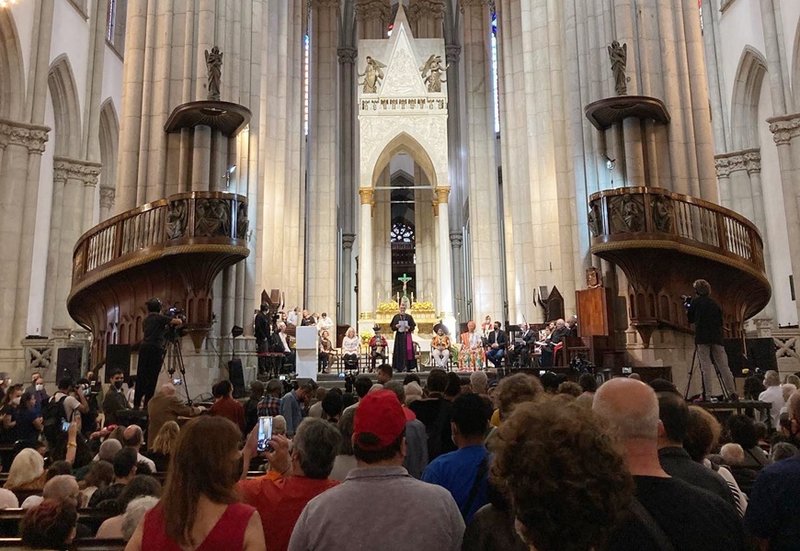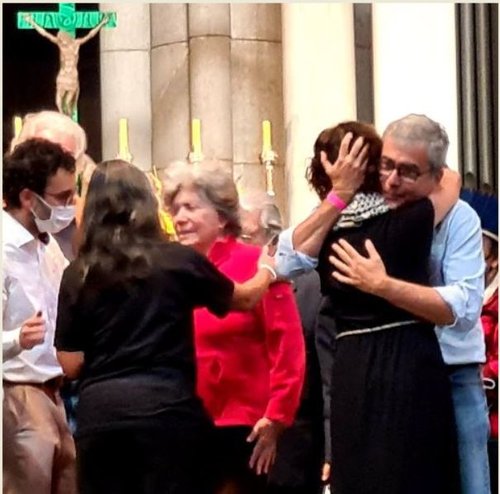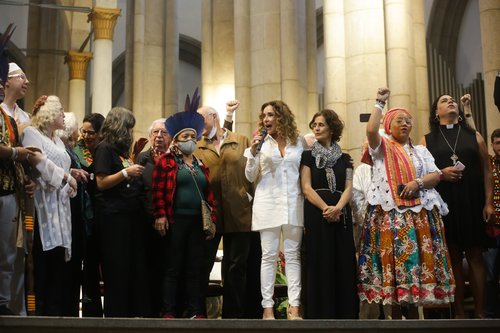Resistance and emotion at the Cathedral of São Paulo
18 Jul 2022, 15:25 Ato inter-religioso em defesa dos povos indígenas na Catedral da Sé - Foto: Foro da Amazônia
Ato inter-religioso em defesa dos povos indígenas na Catedral da Sé - Foto: Foro da Amazônia
The São Paulo Metropolitan Cathedral (also known as the Sé Cathedral), in downtown São Paulo, was once again the stage of a milestone in the country's history, on the morning of July 16th. The Inter-religious Act in honor of Bruno Pereira and Dom Phillips and in defense of the life of Indigenous peoples brought together religious leaders, human rights defenders, artists, social movements, trade unions, politicians, and the general population, in defense of life, land, water, forests, and the culture of Indigenous peoples, traditional communities, rural workers, and riverbank dwellers.
In addition to those who died in a brutal and cruel way defending life and the environment, Dom Paulo Evaristo Arns and Dom Cláudio Hummes – known as the “prophet of the Amazon” for his commitment to the socio-environmental defense of the region – were also revered.
Organized by the Dom Paulo Evaristo Arns Inter-Religious Front for Justice and Peace (Frente Inter-Religiosa Dom Paulo Evaristo Arns por Justiça e Paz, in Portuguese), in partnership with the Justice and Peace Commission of São Paulo, the Arns Commission, the Vladimir Herzog Institute, and the Brazilian Bar Association of the State of São Paulo (OAB-SP), the ceremony filled up the Sé Cathedral. More than 1.500 people participated in the event in person, in addition to the more than 40.000 who followed the event via Internet, which was broadcasted in Brazil, France, and Switzerland.
Beatriz Matos, Bruno's wife, and Alessandra Sampaio, Dom's wife, as well as Indigenous leaders and members of the Interfaith Front were also present. As cultural performers, the event had the Opy Mirim Indigenous Choir (Jareko takuapu amba and Nhanderu papa obojera yvy vai), Marlui Miranda and Toninho Carrasqueira (Despedida dos Espíritos and Koytchewa yeye), Tati Helene (Canto solo do Padre José de Vieira), Chico César (Beradêro and Deus me proteja), and Daniela Mercury (Canto da Cidade, a song chosen by Bruno and Dom's wives), and the Brazilian National Anthem.
At the entrance of the Cathedral, the public was welcomed by a panel with pictures of Indigenous people and environmental defenders who were murdered during the current government, alongside pictures of Chico Mendes and Dorothy Stang. Right beside this panel, there were two tables with Indigenous handicrafts.
During the ceremony, there were several moments of strong emotion: the meeting of Vladimir Herzog's widow Clarice, accompanied by her son Ivo, with Beatriz and Alessandra; Bruno and Dom's videos; the Indigenous, African and Jewish prayers; and the cries for democracy, social justice, peace, and human rights.

Conducted by Father José Bizon and by Afonso Moreira Jr., from the São Paulo State Spiritist Federation, the ceremony began with the presentation of the Opy Mirim Indigenous Choir. Afterward, the Indigenous leader Máximo Wassu said: “Everyone who is here and who values our culture must take this message to those who have no notion of what our culture is.” Máximo then invited Alessandra and Bruna to pray together.
Maria Guarani, on behalf of all the Indigenous peoples, asked: “They must stop exterminating our peoples. It is very important that you are listening to us. It is very sad that our people are dying for our territory. Enough! Indigenous peoples come from this land, they survive on the land. We not only ask for justice, but we also want our rights.” Maria reminded everyone of the villages in Mato Grosso do Sul, of Amambai, and of the Kayowá people that are being murdered every day.
The Ialorixá Omi Lade dedicated her speech to Tebas, her enslaved ancestor who built the old downtown of São Paulo, and to Exu. She stressed the importance of recognizing and acknowledging Indigenous peoples and the peoples of African origin: “The traditional peoples of African origin are worshippers of an ancestry that preserves the land.”
Dom Pedro Luiz Stringhini, the Diocesan Bishop of Mogi das Cruzes and President of the South Regional 1 of the National Conference of Bishops of Brazil (CNBB), recalled the inter-religious service in memory of journalist Vladimir Herzog, murdered by the military dictatorship in 1975. Stringhini also showed solidarity to the family of Marcelo Arruda, murdered in Foz do Iguaçu, and highlighted the dismantling of public policies for environmental preservation. “Democracy is not going away. Elections will be held and democracy will prevail! Security comes through books, not guns,” he reiterated.
The Pentecostal pastor Eliel Batista affirmed that it is necessary to “learn from the Indigenous people how to make this world inhabitable. Christians should use their hands, not to make a gun gesture, but to welcome the needy and then act with concrete gestures of justice.”
Lucia Chermont, from the Jewish Community, read a message from Rabbi Alexandre Leone: “It is our collective responsibility to interweave justice and peace” and then prayed, in Hebrew and Portuguese, El Malei Rachamim (Jewish prayer for the deceased).
A member of the Church of Jesus Christ of Latter-day Saints, Leonel Sá Maia said: “We have the power to create an environment like the one we are living in here and now. Together we can build good moments, of respect, of edification, and this is what we need to resume, the conscious internal motive of this historic moment. May we, from this moment on, have the resumption of the civil impetus.”
Brief biographies of Bruno Pereira and Dom Phillips were read by Claudinei and Tadeu di Pietro. Afterward, a video message from Beto Marubo, an Indigenous member of the Union of Indigenous Peoples of the Javari Valley (União dos Povos Indígenas do Vale do Javari – Univaja, in Portuguese), called on society to reflect on the need for these deaths not to have been in vain: “Up to what point are we going to tolerate that people who dreamed of a healthy environment, who worked for minorities, for the least favored, to meet such a tragic end, like the one my friend Bruno and my friend Dom had? We must not accept that people like them are victims in such a cruel way and we must not think that this is a regional problem. I want to invite you to reflect on this, to get out of our comfort zone, and to act so that the lives of Bruno Pereira and Dom Phillips were not in vain,” Marubo declared.
Asking for applause for traditional Indigenous communities, Alessandra, Dom's widow, highlighted cooperation with Indigenous communities as a way to honor the lives of the journalist and Bruno. “What we can actively do is to learn more about the Amazon, its richness, its biodiversity. Only when you know about something you can protect it and fight for it. I would like to express my true gratitude to the traditional Indigenous communities of Brazil, who keep our forests standing. We have to join this fight, which is also ours.”
Alessandra emphasized Dom's persistence, ethics, and hope that we really could change difficult situations if we were actively involved in movements fighting for change. “This is an invitation that Beatriz and I make to you. We have no option, we have to continue this fight for conservation and respect for traditional peoples, which besides being ours, our families', and our friends', is a fight of all of us Brazilians,” she stated.
According to the anthropologist Beatriz Matos, Bruno's widow, the investigations to clarify the crime are fundamental. “I think that justice is the guarantee and safeguard of the rights and territories of Indigenous peoples, from the Javari Valley and from all the Indigenous territories in the country,” she defended. She also recalled that, even with the great repercussion of the crime, there is an atmosphere of insecurity in the Javari Valley among Indigenous people and indigenists.
According to Beatriz, the spiritual strength of her husband and the British journalist is what moves them at the moment: “We can no longer allow such dedicated people who fight so hard to make life better for all of us to have such a tragic material end. But I believe that their spirits accompany us here and the Indigenous people in the forest. Thank you very much to the Indigenous peoples for their strength.”
The Manifesto, which was the conceptual foundation of the act, was read by Monk Ryosan, from the Zen Buddhist Community of Brazil, and Jurema Marques de Araújo, from the Bahá'i Community of Brazil. The text calls on society to stop the violence against traditional peoples and to demand the strengthening of inspection bodies and respect for Indigenous territories.
At the closure of the act, Daniela Mercury sang one of her songs together with Beatriz and Alessandra. Then, with the participation of all those who were present, she led the choir of the crowded church, which sang the National Anthem together, in one of the most moving moments of the morning.
